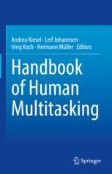Search
Search Results
-
Cognitive control and meta-control in dual-task coordination
When two tasks are presented simultaneously or in close succession, such as in the overlap** task paradigm of the psychological refractory period,...

-
Attentional deficits in fibromyalgia: an ERP study with the oddball dual task and emotional stroop task
The present study investigated the neural correlates of attentional deficits in fibromyalgia through an Oddball Dual Task and an Emotional Stroop...

-
Practice effects on dual-task order coordination and its sequential adjustment
When the performance of two tasks overlaps in time, performance impairments in one or both tasks are common. Various theoretical explanations for how...

-
Impact of process interference on memory encoding and retrieval processes in dual-task situations
Dual-tasks at the memory encoding stage have been shown to decrease recall performance and impair concurrent task performance. In contrast, studies...

-
A mechanism underlying improved dual-task performance after practice: Reviewing evidence for the memory hypothesis
Extensive practice can significantly reduce dual-task costs (i.e., impaired performance under dual-task conditions compared with single-task...

-
Age-Differential Effects of Proactive Control in Dual Tasking: The Moderating Effect of Task Difficulty
Dual tasking refers to the ability to perform two concurrent tasks. Using the psychological refractory period (PRP) paradigm, two experiments...

-
Task-order control in dual-tasks: Only marginal interactions between conflict at lower levels and higher processes of task organization
When simultaneously performing two tasks that share response properties, interference can occur. Besides general performance decrements, performance...

-
Dual-task interference: Bottleneck constraint or capacity sharing? Evidence from automatic and controlled processes
This study investigated whether the interference between two tasks in dual-task processing stems from bottleneck limitations or insufficient...

-

-
Can frequent long stimulus onset ansynchronies (SOAs) foster the representation of two separated task-sets in dual-tasking?
Recent findings suggest that in dual-tasking the elements of the two tasks are associated across tasks and are stored in a conjoint memory episode,...

-
The role of line-orientation processing in the production of the Poggendorff illusion: A dual-task study
Using a dual-task paradigm, the present investigation examined whether processes related to line orientation play a critical role in the production...

-
Dual-Task Performance with Simple Tasks
The present chapter focuses on a basic science perspective on dual-task performance with simple tasks. We will discuss how the investigation of...
-
Response-code conflict in dual-task interference and its modulation by age
Difficulties in performing two tasks at once can arise from several sources and usually increase in advanced age. Tasks with concurrent bimodal...

-
Task integration in complex, bimanual sequence learning tasks
Sequence learning and multitasking studies have largely focused on simple motor skills, which cannot be directly transferred to the plethora of...

-
The role of working memory for task-order coordination in dual-task situations
Dual-task (DT) situations require task-order coordination processes that schedule the processing of two temporally overlap** tasks. Theories on...

-
The temporal dynamics of task processing and choice in a novel multitasking paradigm
This study investigated the temporal dynamics of task performance and voluntary task choice within a multitasking paradigm in which the task-related...

-
Mutual interplay between cognitive offloading and secondary task performance
Various modern tools, such as smartphones, allow for cognitive offloading (i.e., the externalization of cognitive processes). In this study, we...

-
Controlling response order without relying on stimulus order – evidence for flexible representations of task order
In dual-task situations, both component tasks are typically not executed simultaneously but rather one after another. Task order is usually...

-
The double-eged sword effect of perceived overqualification on task performance
Based on the double-process model of emotional cognition, combined with affective event theory and social processing theory, we explore the dual-path...

-
The effect of task load, information reliability and interdependency on anticipation performance
In sport, coaches often explicitly provide athletes with stable contextual information related to opponent action preferences to enhance anticipation...

